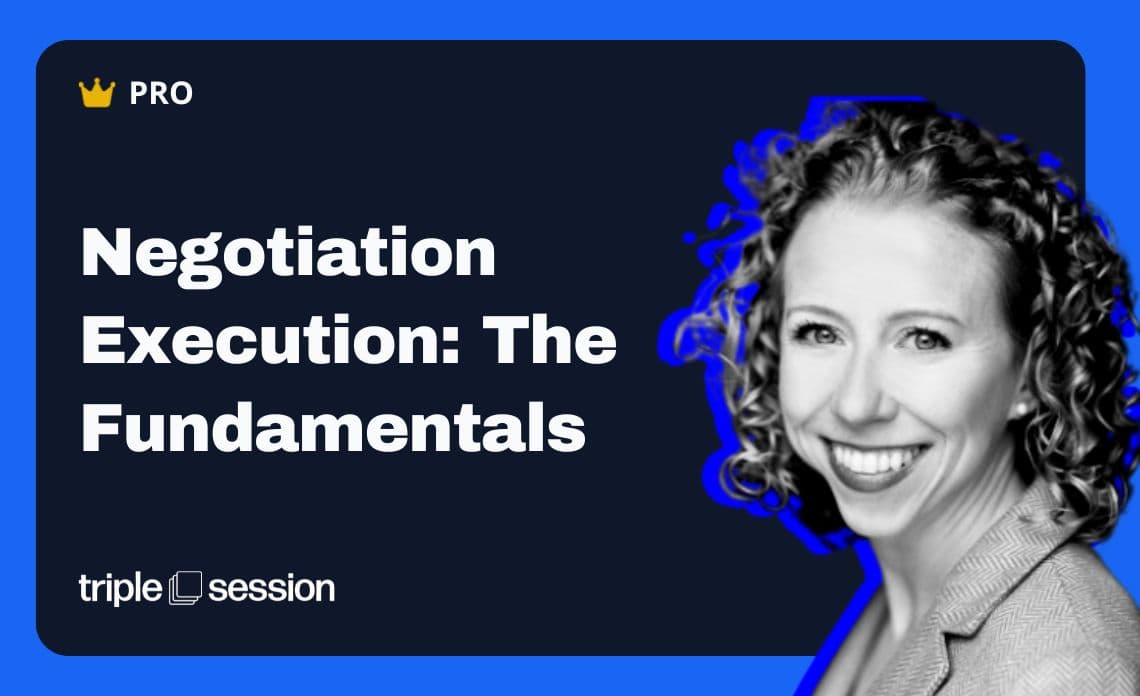
CS Negotiation Execution: The Fundamentals
Laura Kightlinger
CS Leader, Community Builder & Entrepreneur

- duration
- 8 min
- Average Score
- 88%
- Stars
- 5
After all the preparation, it’s finally time to execute. Laura Kightlinger emphasizes two key aspects to focus on during negotiation conversations: 1) weaving a compelling narrative and 2) effectively managing communication. These elements are crucial to ensuring your efforts result in a productive, trust-building discussion with your customer. Let’s explore how to put these strategies into practice for successful negotiations.
What Is the Goal of a Negotiation?
A negotiation is more than just a conversation about price. It’s an opportunity to build trust, showcase value, and align goals between you and your customer.
Think of it as weaving a story—one that’s logical, flows smoothly, and appeals to emotions. By creating a clear and consistent narrative, you lay the groundwork for a win-win outcome.
Key Steps to a Successful Negotiation
1. Reiterate the Existing Agreement
Start the conversation by summarizing the existing agreement. This serves as a solid foundation and ensures both parties are aligned.
Pro Tip: Reiterating past successes, like ROI or benefits, sets a positive tone.2. Acknowledge the Customer’s Perspective
Show that you’ve listened to your customer by mentioning their goals, challenges, and expectations.
- Builds trust and empathy
- Demonstrates your understanding of their needs
3. Explain Your Perspective
Be transparent about your goals and challenges. Frame your offer in the context of how it benefits both parties. This shows your willingness to collaborate and builds credibility.
Clear communication fosters mutual understanding, leading to a stronger partnership.
4. Anticipate and Address Objections
Objections are natural in any negotiation. Stay consistent with your narrative when responding and avoid abrupt changes in your stance.
Key Insight: Responding confidently to objections reinforces your credibility and keeps the conversation productive.5. Balance Live Discussions and Documentation
- Start with a call: Build rapport and clarify goals.
- Follow up with an email: Document key points for clarity and future reference.
This approach combines the emotional connection of live discussions with the precision of written communication.
Why Logic and Emotion Are Essential in Negotiations
Negotiations aren’t just about numbers—they’re human interactions. Appealing to both logic and emotion ensures your arguments are persuasive and relatable.
For example:
- Use data and facts to build a logical case.
- Appeal to the customer’s ego or personal success for an emotional connection.
Best Practices for Building Rapport
1. Use Tone of Voice Effectively
- A warm tone builds trust and eases tension.
- Mirror the customer’s tone to create a sense of alignment.
2. Avoid Over-Reliance on Email
While email is excellent for documentation, live calls allow you to address emotions and build understanding. Don’t let the conversation get stuck behind a keyboard.
3. Keep Communication Clear and Actionable
When summarizing a call in an email:
- Highlight key points
- Include specific next steps
- Write in a way that’s easy for the customer to share internally
Final Takeaways
Negotiation success relies on preparation, communication, and adaptability. Remember to:
- Build a strong narrative that aligns both perspectives.
- Balance logic and emotion to strengthen your position.
- Use a mix of live discussions and email documentation.
By mastering these skills, you can approach any negotiation with confidence and achieve results that benefit both parties.
How Triple Session works
Training, Testing, & Feedback
Triple Session's proven formula accelerates your sales performance through consistent, organized practice, backed by measurable results.

Bite-Sized Knowledge
Our expert-led video sessions simplify complex sales concepts into easy-to-digest 5-15 minute videos for better retention.

Test Your Understanding
After each session, there will be a quiz to test your understanding and help you improve on any areas that need more attention.

Evaluate and Grow
Get progress snapshots after each quiz to track your improvements and achieve your sales mastery goals.